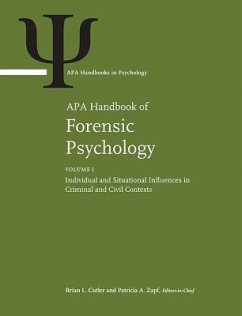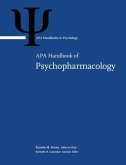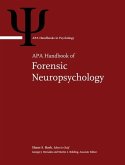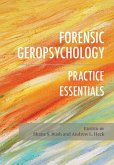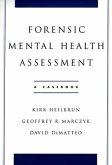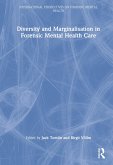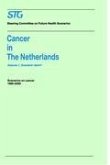APA Handbook of Forensic Psychology: Volume 1: Individual and Situational Influences in Criminal and Civil Contexts Volume 2: Criminal Investigation,
Herausgeber: Zapf, Patricia A.; Cutler, Brian L.
APA Handbook of Forensic Psychology: Volume 1: Individual and Situational Influences in Criminal and Civil Contexts Volume 2: Criminal Investigation,
Herausgeber: Zapf, Patricia A.; Cutler, Brian L.
- Gebundenes Buch
- Merkliste
- Auf die Merkliste
- Bewerten Bewerten
- Teilen
- Produkt teilen
- Produkterinnerung
- Produkterinnerung
Examines the scientific foundations and practical application of psychology to law, the practice of law, and law-related policy. Drawing on contemporary psychological research and practice, this handbook provides a thorough, up-to-date, and far-reaching reference on forensic psychological issues that are important to researchers, practitioners and students in psychology, other social sciences and practice disciplines, and law.
Andere Kunden interessierten sich auch für
![APA Handbook of Psychopharmacology: Volume 1 APA Handbook of Psychopharmacology: Volume 1]() APA Handbook of Psychopharmacology: Volume 1249,99 €
APA Handbook of Psychopharmacology: Volume 1249,99 €![APA Handbook of Forensic Neuropsychology APA Handbook of Forensic Neuropsychology]() APA Handbook of Forensic Neuropsychology249,99 €
APA Handbook of Forensic Neuropsychology249,99 €![Forensic Geropsychology: Practice Essentials Forensic Geropsychology: Practice Essentials]() Forensic Geropsychology: Practice Essentials95,99 €
Forensic Geropsychology: Practice Essentials95,99 €![Forensic Mental Health Assessment: A Casebook Forensic Mental Health Assessment: A Casebook]() Kirk HeilbrunForensic Mental Health Assessment: A Casebook83,99 €
Kirk HeilbrunForensic Mental Health Assessment: A Casebook83,99 €![Diversity and Marginalisation in Forensic Mental Health Care Diversity and Marginalisation in Forensic Mental Health Care]() Diversity and Marginalisation in Forensic Mental Health Care180,99 €
Diversity and Marginalisation in Forensic Mental Health Care180,99 €![Handbook of Nuclear Chemistry: Vol. 1: Basics of Nuclear Science; Vol. 2: Elements and Isotopes: Formation, Transformation, Distribution; Vol. 3: Che Handbook of Nuclear Chemistry: Vol. 1: Basics of Nuclear Science; Vol. 2: Elements and Isotopes: Formation, Transformation, Distribution; Vol. 3: Che]() Attila Vértes / Sándor Nagy / Zoltán et al. Klencsár (Hrsg.)Handbook of Nuclear Chemistry: Vol. 1: Basics of Nuclear Science; Vol. 2: Elements and Isotopes: Formation, Transformation, Distribution; Vol. 3: Che3.678,99 €
Attila Vértes / Sándor Nagy / Zoltán et al. Klencsár (Hrsg.)Handbook of Nuclear Chemistry: Vol. 1: Basics of Nuclear Science; Vol. 2: Elements and Isotopes: Formation, Transformation, Distribution; Vol. 3: Che3.678,99 €![Cancer in the Netherlands Volume 1: Scenario Report, Volume 2: Annexes Cancer in the Netherlands Volume 1: Scenario Report, Volume 2: Annexes]() Steering Committee on Future Health ScenariosCancer in the Netherlands Volume 1: Scenario Report, Volume 2: Annexes154,99 €
Steering Committee on Future Health ScenariosCancer in the Netherlands Volume 1: Scenario Report, Volume 2: Annexes154,99 €-
-
-
Examines the scientific foundations and practical application of psychology to law, the practice of law, and law-related policy. Drawing on contemporary psychological research and practice, this handbook provides a thorough, up-to-date, and far-reaching reference on forensic psychological issues that are important to researchers, practitioners and students in psychology, other social sciences and practice disciplines, and law.
Produktdetails
- Produktdetails
- APA Handbooks in Psychology(r)
- Verlag: American Psychological Association (APA)
- Revised
- Seitenzahl: 1176
- Erscheinungstermin: 15. Dezember 2014
- Englisch
- Abmessung: 292mm x 231mm x 97mm
- Gewicht: 3298g
- ISBN-13: 9781433817939
- ISBN-10: 1433817934
- Artikelnr.: 41626124
- APA Handbooks in Psychology(r)
- Verlag: American Psychological Association (APA)
- Revised
- Seitenzahl: 1176
- Erscheinungstermin: 15. Dezember 2014
- Englisch
- Abmessung: 292mm x 231mm x 97mm
- Gewicht: 3298g
- ISBN-13: 9781433817939
- ISBN-10: 1433817934
- Artikelnr.: 41626124
Brian L. Cutler, PhD, earned a doctorate degree in social psychology from the University of Wisconsin–Madison in 1987. He served on the faculties of Florida International University and the University of North Carolina at Charlotte. He currently serves as professor and associate dean of the Faculty of Social Sciences and Humanities at the University of Ontario Institute of Technology. Dr. Cutler's primary area of research is forensic psychology. He is the editor of Reform of Eyewitness Identification Procedures, Conviction of the Innocent: Lessons From Psychological Research, Expert Testimony on the Psychology of Eyewitness Identification, and the Encyclopedia of Psychology and Law. He is also the author or coauthor of four books; 25 chapters in edited volumes; and 67 articles in peer-reviewed psychology, social psychology, psychology-law, and law journals. Dr. Cutler has taught undergraduate and graduate courses in introductory psychology, social psychology, psychology-law, research methods, professional writing, and professional development. He has trained undergraduate, masters, and doctoral students in psychology-law research. He has also served as a mentor to junior faculty members, providing professional development guidance and advice. Dr. Cutler served as editor-in-chief of Law and Human Behavior, the journal of the American Psychology-Law Society, from 2005 to 2011. He also served as president-elect, president, and immediate past president of the American Psychology-Law Society from 2011 to 2013. He has taught continuing legal education courses on psychology-law topics to attorneys in the United States and has served as a consultant and expert witness in cases involving eyewitness identification and false confessions in the United States and Canada. Patricia A. Zapf, PhD, earned a doctorate degree in clinical forensic psychology from Simon Fraser University in Canada and is currently a professor in the Department of Psychology at John Jay College of Criminal Justice, The City University of New York. She was recently elected president of the American Psychology-Law Society, and she is the editor of the American Psychology-Law Society book series and the associate editor of Law and Human Behavior. Dr. Zapf is the author of eight books and manuals and more than 85 articles and chapters, mainly on the assessment and conceptualization of criminal competencies. She was appointed Fellow of APA and Distinguished Member of the American Psychology-Law Society in 2006 for outstanding contributions to the field of law and psychology for her work in competency evaluation. In addition to her academic endeavors, Dr. Zapf serves as a consultant to various criminal justice and policy organizations and has a private practice in forensic assessment. She has conducted more than 2,500 forensic evaluations in the United States and Canada and has served as an expert witness in a number of cases, including the competency hearing of Jose Padilla. Dr. Zapf is the author of Best Practices in Forensic Mental Health Assessment: Evaluation of Competence to Stand Trial ; editor of Forensic Assessments in Criminal and Civil Law: A Handbook for Lawyers; and associate editor of the Encyclopedia of Psychology and Law. She served on the National Judicial College's Mental Competency: Best Practices Model panel of experts and travels throughout the United States and internationally to train legal and mental health professionals on best practices in forensic evaluation.
Volume 1: Individual and Situational Influences in Criminal and Civil
Contexts
Editorial Board
About the Editors-in-Chief
Contributors
Series Preface
Introduction
Part I: Forensic Evaluation and Treatment in Criminal Cases
Chapter 1: Foundational Aspects of Forensic Mental Health Assessment
Kirk Heilbrun and Casey D. LaDuke
Chapter 2: Forensic Assessment Instruments
Richard Rogers and Chelsea E. Fiduccia
Chapter 3: Risk Assessment and Communication
Laura S. Guy, Kevin S. Douglas, and Stephen D. Hart
Chapter 4: Legal Insanity and Mens Rea Defenses
Ira K. Packer
Chapter 5: Criminal Competencies
Daniel C. Murrie and Heather Zelle
Chapter 6: Mental Health Treatment of Criminal Offenders
Barry Rosenfeld, Jacqueline Howe, Ashley Pierson, and Melodie Foellmi
Chapter 7: Capital Case Considerations
David DeMatteo, Michael Keesler, Megan Murphy, and Heidi Strohmaier
Part II. Individual and Situational Predictors of Criminal Behavior
Chapter 8: Criminal Behavior
Shelley L. Brown, Shannon Gottschall, and Craig Bennell
Chapter 9: Psychopathy
Kevin S. Douglas, Natalia L. Nikolova, Shannon E. Kelley, and John F. Edens
Chapter 10: Substance Use and Crime
David DeMatteo, Sarah Filone, and Jennie Davis
Chapter 11: Sexual Offending
Michael C. Seto, Drew A. Kingston, and Skye Stephens
Chapter 12: Intimate Partner Violence
Tonia L. Nicholls and John Hamel
Part III: Applications of Forensic Psychology in Civil Cases
Chapter 13: Child Custody and Access
Marc J. Ackerman and Jonathan W. Gould
Chapter 14: Personal Injury and Other Tort Matters
Eric Y. Drogin, Leigh D. Hagan, Thomas J. Guilmette, and Lisa Drago
Piechowski
Chapter 15: Employment Discrimination
Margaret S. Stockdale, Katherine A. Sliter, and Leslie Ashburn-Nardo
Chapter 16: Civil Competencies
Douglas Mossman and Helen M. Farrell
Index
Volume 2: Criminal Investigation, Adjudication, and Sentencing Outcomes
Editorial Board
Part I: Victim and Offender Groups
Chapter 1: Children as Witnesses
Debra Ann Poole, Sonja P. Brubacher, and Jason J. Dickinson
Chapter 2: Juvenile Offenders
Jennifer L. Woolard, Sarah Vidal, and Erika Fountain
Chapter 3: Elders and the Justice System
Eve M. Brank and Lindsey E. Wylie
Chapter 4: Female Offenders
Tonia L. Nicholls, Keith R. Cruise, Duncan Greig, and Holly Hinz
Chapter 5: Race in the Justice System
Jennifer S. Hunt
Part II: Criminal Investigations and Jury Trials
Chapter 6: Investigative Psychology
Paul J. Taylor, Brent Snook, Craig Bennell, and Louise Porter
Chapter 7: Eyewitness Memory
Nancy K. Steblay
Chapter 8: Deception Detection
Aldert Vrij
Chapter 9: Confessions
Saul M. Kassin, Jennifer T. Perillo, Sara C. Appleby, and Jeff Kukucka
Chapter 10: Jury Decision Making
Margaret Bull Kovera and Lora M. Levett
Chapter 11: Media and the Law
Jennifer Groscup
Chapter 12: Procedural Justice
Diane Sivasubramaniam and Larry Heuer
Part III: Sentencing and Incarceration
Chapter 13: Probation and Parole
Jill Viglione and Faye S. Taxman
Chapter 14: Sentencing
R. Barry Ruback
Chapter 15: Prison Overcrowding
Craig Haney
Chapter 16: Community Corrections
Erin Crites, Courtney Porter, and Faye S. Taxman
Chapter 17: The Death Penalty
Craig Haney, Joanna Weill, and Mona Lynch
Index
Contexts
Editorial Board
About the Editors-in-Chief
Contributors
Series Preface
Introduction
Part I: Forensic Evaluation and Treatment in Criminal Cases
Chapter 1: Foundational Aspects of Forensic Mental Health Assessment
Kirk Heilbrun and Casey D. LaDuke
Chapter 2: Forensic Assessment Instruments
Richard Rogers and Chelsea E. Fiduccia
Chapter 3: Risk Assessment and Communication
Laura S. Guy, Kevin S. Douglas, and Stephen D. Hart
Chapter 4: Legal Insanity and Mens Rea Defenses
Ira K. Packer
Chapter 5: Criminal Competencies
Daniel C. Murrie and Heather Zelle
Chapter 6: Mental Health Treatment of Criminal Offenders
Barry Rosenfeld, Jacqueline Howe, Ashley Pierson, and Melodie Foellmi
Chapter 7: Capital Case Considerations
David DeMatteo, Michael Keesler, Megan Murphy, and Heidi Strohmaier
Part II. Individual and Situational Predictors of Criminal Behavior
Chapter 8: Criminal Behavior
Shelley L. Brown, Shannon Gottschall, and Craig Bennell
Chapter 9: Psychopathy
Kevin S. Douglas, Natalia L. Nikolova, Shannon E. Kelley, and John F. Edens
Chapter 10: Substance Use and Crime
David DeMatteo, Sarah Filone, and Jennie Davis
Chapter 11: Sexual Offending
Michael C. Seto, Drew A. Kingston, and Skye Stephens
Chapter 12: Intimate Partner Violence
Tonia L. Nicholls and John Hamel
Part III: Applications of Forensic Psychology in Civil Cases
Chapter 13: Child Custody and Access
Marc J. Ackerman and Jonathan W. Gould
Chapter 14: Personal Injury and Other Tort Matters
Eric Y. Drogin, Leigh D. Hagan, Thomas J. Guilmette, and Lisa Drago
Piechowski
Chapter 15: Employment Discrimination
Margaret S. Stockdale, Katherine A. Sliter, and Leslie Ashburn-Nardo
Chapter 16: Civil Competencies
Douglas Mossman and Helen M. Farrell
Index
Volume 2: Criminal Investigation, Adjudication, and Sentencing Outcomes
Editorial Board
Part I: Victim and Offender Groups
Chapter 1: Children as Witnesses
Debra Ann Poole, Sonja P. Brubacher, and Jason J. Dickinson
Chapter 2: Juvenile Offenders
Jennifer L. Woolard, Sarah Vidal, and Erika Fountain
Chapter 3: Elders and the Justice System
Eve M. Brank and Lindsey E. Wylie
Chapter 4: Female Offenders
Tonia L. Nicholls, Keith R. Cruise, Duncan Greig, and Holly Hinz
Chapter 5: Race in the Justice System
Jennifer S. Hunt
Part II: Criminal Investigations and Jury Trials
Chapter 6: Investigative Psychology
Paul J. Taylor, Brent Snook, Craig Bennell, and Louise Porter
Chapter 7: Eyewitness Memory
Nancy K. Steblay
Chapter 8: Deception Detection
Aldert Vrij
Chapter 9: Confessions
Saul M. Kassin, Jennifer T. Perillo, Sara C. Appleby, and Jeff Kukucka
Chapter 10: Jury Decision Making
Margaret Bull Kovera and Lora M. Levett
Chapter 11: Media and the Law
Jennifer Groscup
Chapter 12: Procedural Justice
Diane Sivasubramaniam and Larry Heuer
Part III: Sentencing and Incarceration
Chapter 13: Probation and Parole
Jill Viglione and Faye S. Taxman
Chapter 14: Sentencing
R. Barry Ruback
Chapter 15: Prison Overcrowding
Craig Haney
Chapter 16: Community Corrections
Erin Crites, Courtney Porter, and Faye S. Taxman
Chapter 17: The Death Penalty
Craig Haney, Joanna Weill, and Mona Lynch
Index
Volume 1: Individual and Situational Influences in Criminal and Civil
Contexts
Editorial Board
About the Editors-in-Chief
Contributors
Series Preface
Introduction
Part I: Forensic Evaluation and Treatment in Criminal Cases
Chapter 1: Foundational Aspects of Forensic Mental Health Assessment
Kirk Heilbrun and Casey D. LaDuke
Chapter 2: Forensic Assessment Instruments
Richard Rogers and Chelsea E. Fiduccia
Chapter 3: Risk Assessment and Communication
Laura S. Guy, Kevin S. Douglas, and Stephen D. Hart
Chapter 4: Legal Insanity and Mens Rea Defenses
Ira K. Packer
Chapter 5: Criminal Competencies
Daniel C. Murrie and Heather Zelle
Chapter 6: Mental Health Treatment of Criminal Offenders
Barry Rosenfeld, Jacqueline Howe, Ashley Pierson, and Melodie Foellmi
Chapter 7: Capital Case Considerations
David DeMatteo, Michael Keesler, Megan Murphy, and Heidi Strohmaier
Part II. Individual and Situational Predictors of Criminal Behavior
Chapter 8: Criminal Behavior
Shelley L. Brown, Shannon Gottschall, and Craig Bennell
Chapter 9: Psychopathy
Kevin S. Douglas, Natalia L. Nikolova, Shannon E. Kelley, and John F. Edens
Chapter 10: Substance Use and Crime
David DeMatteo, Sarah Filone, and Jennie Davis
Chapter 11: Sexual Offending
Michael C. Seto, Drew A. Kingston, and Skye Stephens
Chapter 12: Intimate Partner Violence
Tonia L. Nicholls and John Hamel
Part III: Applications of Forensic Psychology in Civil Cases
Chapter 13: Child Custody and Access
Marc J. Ackerman and Jonathan W. Gould
Chapter 14: Personal Injury and Other Tort Matters
Eric Y. Drogin, Leigh D. Hagan, Thomas J. Guilmette, and Lisa Drago
Piechowski
Chapter 15: Employment Discrimination
Margaret S. Stockdale, Katherine A. Sliter, and Leslie Ashburn-Nardo
Chapter 16: Civil Competencies
Douglas Mossman and Helen M. Farrell
Index
Volume 2: Criminal Investigation, Adjudication, and Sentencing Outcomes
Editorial Board
Part I: Victim and Offender Groups
Chapter 1: Children as Witnesses
Debra Ann Poole, Sonja P. Brubacher, and Jason J. Dickinson
Chapter 2: Juvenile Offenders
Jennifer L. Woolard, Sarah Vidal, and Erika Fountain
Chapter 3: Elders and the Justice System
Eve M. Brank and Lindsey E. Wylie
Chapter 4: Female Offenders
Tonia L. Nicholls, Keith R. Cruise, Duncan Greig, and Holly Hinz
Chapter 5: Race in the Justice System
Jennifer S. Hunt
Part II: Criminal Investigations and Jury Trials
Chapter 6: Investigative Psychology
Paul J. Taylor, Brent Snook, Craig Bennell, and Louise Porter
Chapter 7: Eyewitness Memory
Nancy K. Steblay
Chapter 8: Deception Detection
Aldert Vrij
Chapter 9: Confessions
Saul M. Kassin, Jennifer T. Perillo, Sara C. Appleby, and Jeff Kukucka
Chapter 10: Jury Decision Making
Margaret Bull Kovera and Lora M. Levett
Chapter 11: Media and the Law
Jennifer Groscup
Chapter 12: Procedural Justice
Diane Sivasubramaniam and Larry Heuer
Part III: Sentencing and Incarceration
Chapter 13: Probation and Parole
Jill Viglione and Faye S. Taxman
Chapter 14: Sentencing
R. Barry Ruback
Chapter 15: Prison Overcrowding
Craig Haney
Chapter 16: Community Corrections
Erin Crites, Courtney Porter, and Faye S. Taxman
Chapter 17: The Death Penalty
Craig Haney, Joanna Weill, and Mona Lynch
Index
Contexts
Editorial Board
About the Editors-in-Chief
Contributors
Series Preface
Introduction
Part I: Forensic Evaluation and Treatment in Criminal Cases
Chapter 1: Foundational Aspects of Forensic Mental Health Assessment
Kirk Heilbrun and Casey D. LaDuke
Chapter 2: Forensic Assessment Instruments
Richard Rogers and Chelsea E. Fiduccia
Chapter 3: Risk Assessment and Communication
Laura S. Guy, Kevin S. Douglas, and Stephen D. Hart
Chapter 4: Legal Insanity and Mens Rea Defenses
Ira K. Packer
Chapter 5: Criminal Competencies
Daniel C. Murrie and Heather Zelle
Chapter 6: Mental Health Treatment of Criminal Offenders
Barry Rosenfeld, Jacqueline Howe, Ashley Pierson, and Melodie Foellmi
Chapter 7: Capital Case Considerations
David DeMatteo, Michael Keesler, Megan Murphy, and Heidi Strohmaier
Part II. Individual and Situational Predictors of Criminal Behavior
Chapter 8: Criminal Behavior
Shelley L. Brown, Shannon Gottschall, and Craig Bennell
Chapter 9: Psychopathy
Kevin S. Douglas, Natalia L. Nikolova, Shannon E. Kelley, and John F. Edens
Chapter 10: Substance Use and Crime
David DeMatteo, Sarah Filone, and Jennie Davis
Chapter 11: Sexual Offending
Michael C. Seto, Drew A. Kingston, and Skye Stephens
Chapter 12: Intimate Partner Violence
Tonia L. Nicholls and John Hamel
Part III: Applications of Forensic Psychology in Civil Cases
Chapter 13: Child Custody and Access
Marc J. Ackerman and Jonathan W. Gould
Chapter 14: Personal Injury and Other Tort Matters
Eric Y. Drogin, Leigh D. Hagan, Thomas J. Guilmette, and Lisa Drago
Piechowski
Chapter 15: Employment Discrimination
Margaret S. Stockdale, Katherine A. Sliter, and Leslie Ashburn-Nardo
Chapter 16: Civil Competencies
Douglas Mossman and Helen M. Farrell
Index
Volume 2: Criminal Investigation, Adjudication, and Sentencing Outcomes
Editorial Board
Part I: Victim and Offender Groups
Chapter 1: Children as Witnesses
Debra Ann Poole, Sonja P. Brubacher, and Jason J. Dickinson
Chapter 2: Juvenile Offenders
Jennifer L. Woolard, Sarah Vidal, and Erika Fountain
Chapter 3: Elders and the Justice System
Eve M. Brank and Lindsey E. Wylie
Chapter 4: Female Offenders
Tonia L. Nicholls, Keith R. Cruise, Duncan Greig, and Holly Hinz
Chapter 5: Race in the Justice System
Jennifer S. Hunt
Part II: Criminal Investigations and Jury Trials
Chapter 6: Investigative Psychology
Paul J. Taylor, Brent Snook, Craig Bennell, and Louise Porter
Chapter 7: Eyewitness Memory
Nancy K. Steblay
Chapter 8: Deception Detection
Aldert Vrij
Chapter 9: Confessions
Saul M. Kassin, Jennifer T. Perillo, Sara C. Appleby, and Jeff Kukucka
Chapter 10: Jury Decision Making
Margaret Bull Kovera and Lora M. Levett
Chapter 11: Media and the Law
Jennifer Groscup
Chapter 12: Procedural Justice
Diane Sivasubramaniam and Larry Heuer
Part III: Sentencing and Incarceration
Chapter 13: Probation and Parole
Jill Viglione and Faye S. Taxman
Chapter 14: Sentencing
R. Barry Ruback
Chapter 15: Prison Overcrowding
Craig Haney
Chapter 16: Community Corrections
Erin Crites, Courtney Porter, and Faye S. Taxman
Chapter 17: The Death Penalty
Craig Haney, Joanna Weill, and Mona Lynch
Index

